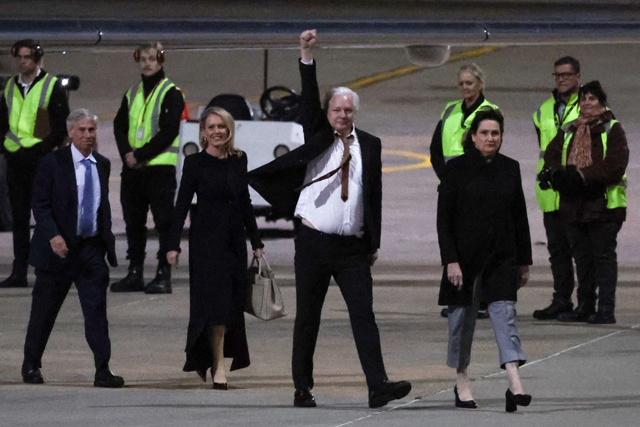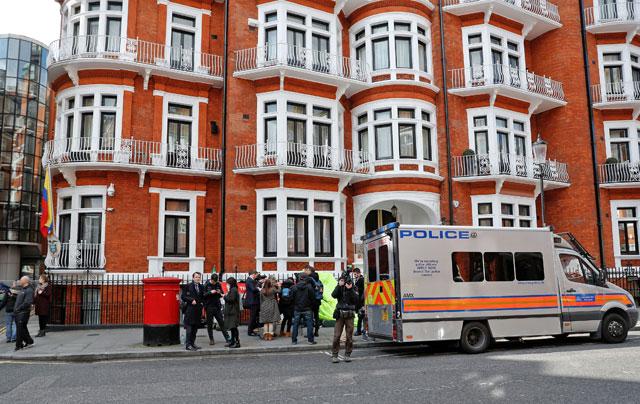You are here
WikiLeaks’ Assange marries in prison
By AFP - Mar 23,2022 - Last updated at Mar 23,2022
LONDON — WikiLeaks founder Julian Assange and his fiancee Stella Moris married on Wednesday at the high-security London prison where he is being held during his extradition case.
Assange, 50, is fighting attempts to remove him from Britain to face trial in the United States over the publication of secret files relating to the wars in Iraq and Afghanistan.
Last week, the UK supreme court turned down a request to hear his appeal against the move, bringing the long-running legal saga nearer to a conclusion.
Assange and Moris, a former member of his legal team, announced their engagement in November and were given permission to marry at Belmarsh prison in southeast London where he is on remand.
"I'm very happy, I'm very sad. I love Julian with all my heart... he is wonderful, he should be free," a tearful Moris said after the ceremony as she cut the cake outside the prison, surrounded by supporters.
She had earlier written in The Guardian newspaper that the ceremony was "not a prison wedding".
"It is a declaration of love and resilience in spite of the prison walls, in spite of the political persecution, in spite of the arbitrary detention," she added.
Moris arrived at the prison in a Vivienne Westwood-designed grey dress, decorated with the words "noble", "free" and "tumultuous".
She was accompanied by the couple's two young sons, wearing kilts in a nod to Assange's Scottish heritage, and her now father-in-law, Richard.
The boys were born while Assange was living at the Ecuadoran embassy in London after he skipped bail to avoid a separate extradition request for him to face claims of sexual assault in Sweden. The case was later dropped.
Westwood, a long-standing supporter of the Australian publisher, also provided him with the traditional Scottish attire.
The Don't Extradite Assange (DEA) group said the wedding was conducted by a registrar, with just four guests, two witnesses — and two security guards — in attendance.
The guests had to leave immediately after the ceremony. Supporters threw confetti at the prison gates, as police in high-visibility jackets looked on.
'Prisoner X'
Moris earlier criticised British authorities for not allowing Assange to be seen for almost three years.
"Julian is being turned into prisoner X, an abstraction that is neither seen nor heard, and therefore non-existent," Moris wrote in The Guardian.
"Julian is being disappeared because his imprisonment is a national disgrace, an embarrassment for the British state, and a vicious, authoritarian move."
Assange has become a figurehead for media freedom campaigners, who accuse Washington of trying to muzzle reporting of legitimate security concerns.
If found guilty of violating the US Espionage Act by publishing military and diplomatic files, he could face the rest of his life in prison.
For critics, he is seen as having been reckless with classified information that may have endangered the lives of sources.
Assange initially won a ruling against his extradition, after his lawyers successfully argued he would be a suicide risk if he were transferred to the United States.
But the US government appealed, and persuaded judges that he would not be held in solitary confinement at a high-security federal detention facility.
He has spent most of the past decade in custody or holed up in Ecuador's London embassy, trying to avoid another extradition after Sweden sought his transfer to answer claims of sexual assault. That case was later dropped.
After the Supreme Court blocked his application, UK Home Secretary Priti Patel will make a final decision on the case, unless Assange's lawyers launch another challenge on a separate point in the case.
Related Articles
LONDON — Lawyers for Julian Assange on Thursday dismissed US assurances about the treatment awaiting the WikiLeaks founder if he is extradi
CANBERRA — WikiLeaks founder Julian Assange returned home to Australia to start life as a free man on Wednesday after admitting he revealed
LONDON — WikiLeaks founder Julian Assange was arrested on Thursday by British police and carried out of the Ecuadorean embassy, where he has

















